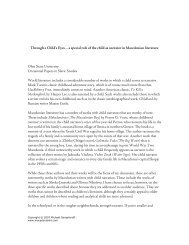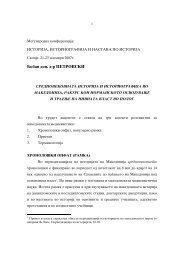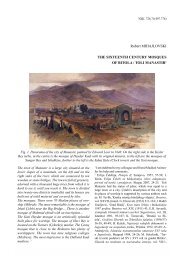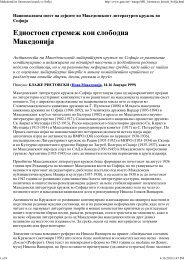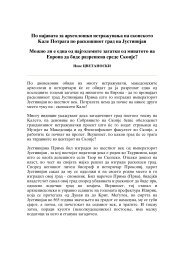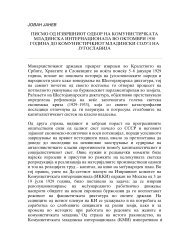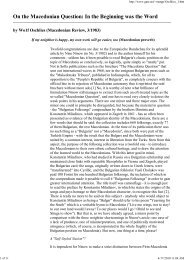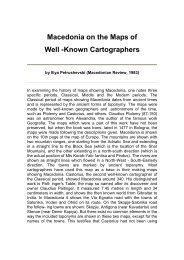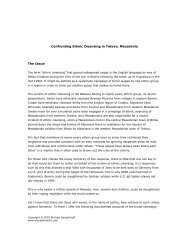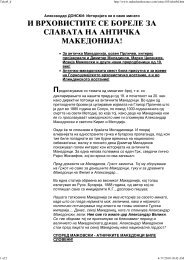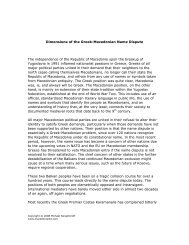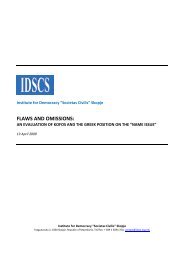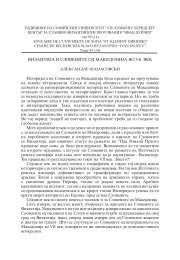Macedonian State-National Concepts and ... - Makedonika
Macedonian State-National Concepts and ... - Makedonika
Macedonian State-National Concepts and ... - Makedonika
Create successful ePaper yourself
Turn your PDF publications into a flip-book with our unique Google optimized e-Paper software.
<strong>and</strong> a half, the 11 issues of the journal presented the true feelings <strong>and</strong> aspirations<br />
of the <strong>Macedonian</strong>s to the international public, serving as the most competent<br />
mouthpiece of the struggle for the preservation of Macedonia’s integrity <strong>and</strong><br />
freedom. It published a large number of ideas dealing with the future organization<br />
of the Balkans <strong>and</strong> the Slavic world <strong>and</strong> about the place of Macedonia there. But<br />
as a result of joint actions by Serbia, Bulgaria <strong>and</strong> Greece in St Petersburg/Petrograd,<br />
the journal was finally banned in November 1914. Yet this was by no means<br />
the end of the endeavours of the <strong>Macedonian</strong>s to attain their national liberation<br />
objectives.<br />
June 7, 1913, saw the publication of the second Memor<strong>and</strong>um of the <strong>Macedonian</strong>s<br />
to the Governments <strong>and</strong> the Public Opinion of the Allied Balkan<br />
<strong>State</strong>s, signed by the “authorized persons”, Dimitrija Ëupovski, Georgi Georgov,<br />
Nace D. Dimov, Dr Gavril KonstantinoviÌ <strong>and</strong> Chem[ical] Eng[ineer] I. Georgov.<br />
The dem<strong>and</strong>s were formulated in five items that again envisaged Macedonia’s<br />
association with Balkan relations.<br />
This was a period when a number of declarations <strong>and</strong> resolutions were made<br />
with the participation of the <strong>Macedonian</strong>s living in the Russian capital, <strong>and</strong> they<br />
always involved a broader Balkan or South-Slav federal community. Yet the<br />
Second Balkan War <strong>and</strong> the Peace Treaty of Bucharest, dictated by the ‘victors’,<br />
also sanctioned the partition of Macedonia in terms of international law <strong>and</strong> in<br />
fact. But peace was still not secured, <strong>and</strong> the great world war was yet to come.<br />
8.<br />
To secure a legal representative body, the <strong>Macedonian</strong>s tried to form the Ss Cyril<br />
<strong>and</strong> Methodius Russian-<strong>Macedonian</strong> Charitable Society <strong>and</strong> on November 25,<br />
1913, proposed a ‘Constitution’ with roughly the same goals <strong>and</strong> tasks as those of<br />
1903 <strong>and</strong> 1912. The Russian authorities, however, on the insistence of Serbia, once<br />
again refused to issue a permit for the activity of this society. After the intervention<br />
of the Serbian diplomatic representative in St Petersburg, the Russian government<br />
stopped the publication of the journal Makedonskij Golos (Makedonski Glas), but<br />
six months later, at the moment when the First World War broke out <strong>and</strong> new hopes<br />
arose for the annulment of the Treaty of Bucharest, it started appearing again. The<br />
editorial board was forbidden to publish attacks against the Kingdom of Serbia,<br />
as this stood on the side of Russia in the war, but the articles in the two last issues<br />
were full of testimonies about the struggle of the <strong>Macedonian</strong>s for liberation <strong>and</strong><br />
unification.<br />
At the time when the journal was banned, the <strong>Macedonian</strong> Colony expressed<br />
its views on specific questions through separate publications; for instance, the<br />
246



